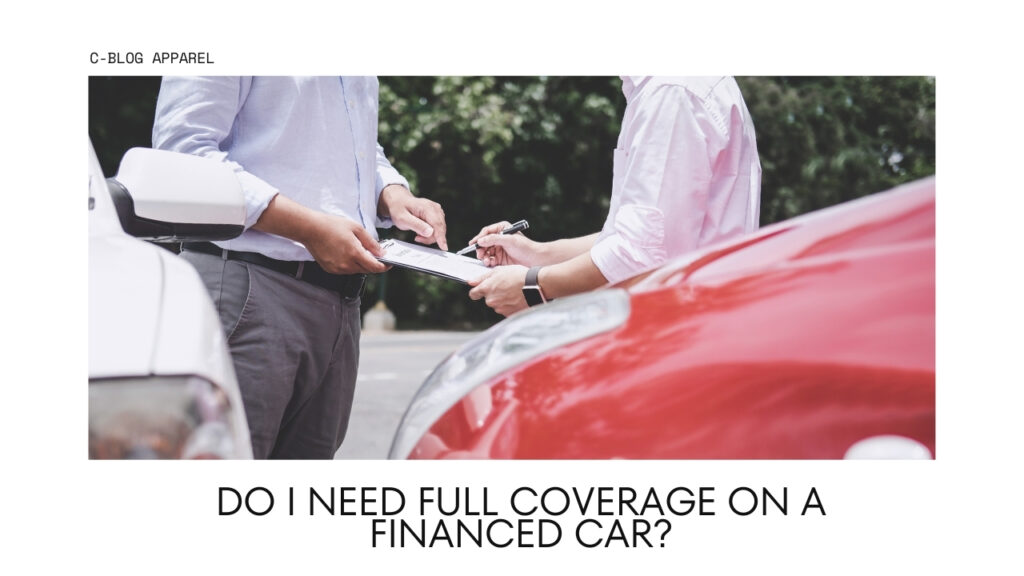Yes, full coverage is almost always required for financed cars. Lenders see it as protecting their investment if your vehicle gets totaled or stolen.
Introduction
When you take out a loan to purchase a vehicle, determining the appropriate insurance coverage becomes a pivotal aspect of your financial planning. While basic liability insurance is a minimum requirement for all drivers, the deliberation over securing full coverage insurance for a car under finance is crucial. This decision transcends mere legal compliance, extending into safeguarding your investment and adhering to the stipulations demanded by financing entities. Full coverage, encompassing collision, comprehensive, and liability policies, provides an expansive shield against various potential adversities, including vehicular damages, theft, and natural calamities. Grasping the significance of full vehicle coverage on finance is vital for any car buyer aiming to make a well-informed choice that ensures fiscal protection and mental tranquility.
Understanding Car Insurance Basics
Delving into car insurance essentials brings up a critical consideration for those financing their vehicle: the necessity of full coverage. Grasping car insurance fundamentals reveals that full coverage protects your vehicle beyond the obligatory liability insurance—which safeguards against damages to third parties. This includes coverage for collisions, theft, and various unforeseen incidents. For individuals with a financed car, securing full coverage is typically mandated by lenders to ensure the vehicle, acting as the loan’s security, is well-protected against any loss until the finance is fully settled. This comprehensive safeguard is crucial in maintaining the vehicle’s value and financial security.
Definition of Full Coverage Insurance
Full coverage insurance is an all-encompassing policy providing extensive vehicle protection. It’s particularly relevant when pondering, “Do I need full coverage on a financed car?” This type of insurance goes beyond the basic requirements, covering many incidents that could affect your financed vehicle.
Difference Between Liability Insurance and Full Coverage
The primary differentiation lies within the scope of protection. Liability insurance covers damages your vehicle may cause to others, an essential requirement by law. However, full coverage extends beyond this, safeguarding your financed car against direct damages, theft, and other risks, offering a broader safety net.
Critical Components of Full Coverage
Complete coverage is a blend of collision, comprehensive, and liability insurance. Collision coverage is designed to facilitate the repair of your vehicle following an accidentcomprehensive covers non-collision related incidents like theft or natural disasters, and liability ensures you’re protected against costs from damages or injuries you might cause to others. This trio is essential for anyone with a financed car, providing complete protection.
Requirements for Financed Cars
Understanding insurance requirements becomes a pivotal question for those financing a vehicle, often summarized as, “Do I need full coverage on a financed car?” The answer typically leans towards yes due to the conditions set by lenders aiming to protect their investments. Financing a car means the lender retains a vested interest in the vehicle’s condition until the loan is fully repaid. Consequently, lenders mandate full coverage insurance to safeguard against potential loss or damage. This requirement ensures that in the event of an accident, theft, or other damages, the financial value of the vehicle is preserved, protecting both the lender’s and borrower’s interests. Full coverage, therefore, becomes not just an option but a necessity for financed cars, encompassing collision, comprehensive, and liability protection to meet the lender’s stipulations and provide peace of mind to the borrower.
Explanation of Lender’s Insurance Requirements for Financed Vehicles
Lenders insist on full coverage insurance for financed cars to protect their investments from unforeseen events. This requirement addresses the pivotal question, “Do I need full coverage on a financed car?” ensuring the vehicle’s value is safeguarded against all damages.
The Role of Comprehensive and Collision Insurance for Financed Cars
Comprehensive and collision insurance plays crucial roles for financed vehicles. Comprehensive coverage protects against non-collision incidents, like theft or natural disasters, while collision insurance covers damages from accidents. Together, they form the backbone of full coverage, ensuring financed cars are fully protected.
Legal Requirements vs. Lender Requirements
While legal requirements typically mandate minimum liability coverage, lenders have more stringent demands for financed cars, requiring full coverage. This distinction highlights the broader protection lenders seek beyond legal mandates, emphasizing the importance of full coverage for financed vehicles to ensure comprehensive protection.
Benefits of Full Coverage for Financed Cars
Opting for full coverage on a financed car comes with substantial benefits, directly addressing the standard query, “Do I need full coverage on a financed car?” This comprehensive insurance meets lender requirements and provides an extensive safety net. It encompasses protection against various incidents—from collisions and theft to natural disasters—ensuring your financial investment remains secure throughout the loan period. Full coverage alleviates the potential financial burden following unexpected events, covering repair or replacement costs that otherwise might derail your finances. Moreover, it fosters peace of mind, knowing that the financial implications are manageable regardless of what happens. Complete coverage isn’t just an insurance policy for those financing a vehicle—it’s a strategic decision to protect your assets and financial well-being.
Safeguarding against financial losses resulting from accidents, theft, and natural disasters.
Securing full coverage on a financed car is pivotal for shielding oneself from the financial repercussions of unforeseen mishaps. This comprehensive approach covers accident expenses, ensuring you’re in pocket for repairs or replacements. Similarly, it extends to theft and natural disasters, safeguarding your investment against almost all forms of loss. This breadth of protection is crucial for maintaining financial stability.
Meeting Lender Requirements to Avoid Potential Contract Violations
Adhering to lender stipulations with full coverage avoids the risk of contract breaches. Lenders mandate full coverage to protect their interest in the financed vehicle, making it a non-negotiable part of financing agreements. This compliance ensures smooth financial relations and prevents legal complications or additional fees associated with insurance shortcomings.
Peace of Mind for Borrowers
The assurance that comes with full coverage is invaluable. Knowing that your financed car is protected against a spectrum of risks meets a legal or financial obligation and offers significant peace of mind. It allows borrowers to focus on enjoying their vehicle and ensure they are well-protected financially, addressing the essential question, “Do I need full coverage on a financed car?” with a resounding yes.
Considerations When Choosing Full Coverage
Selecting full coverage on a financed car requires thoughtful consideration to ensure your decision aligns with your financial and protective needs. Evaluating the vehicle’s value and weighing it against the cost of obtaining full coverage is essential, considering how depreciation might affect this balance over time. Understanding the specifics of what your policy entails, including the deductible amounts and the breadth of protection offered. These elements will determine how well you are safeguarded against unforeseen financial challenges, making full coverage a strategic choice for anyone seeking comprehensive insurance for their financed vehicle.
Assessing the Value of the Vehicle vs. Cost of Full Coverage
When considering full coverage on a financed car, evaluating your vehicle’s worth against the insurance cost is critical. This assessment ensures your coverage expenses are justified, particularly as your vehicle’s value depreciates over time, potentially altering the cost-benefit ratio of such comprehensive insurance.
Impact of Deductible Amounts on Premiums and Out-of-Pocket Costs
Choosing a deductible is a significant factor in the realm of full coverage. Opting for higher deductibles may lead to lower monthly premiums, however, increases the amount you’ll need to pay out-of-pocket in case of a claim. It’s a balancing act between manageable premium costs and readiness for potential financial outlays following an incident.
The Potential for Gap Insurance to Cover the Difference Between the Car’s Value and the Amount Owed
Gap insurance is a crucial consideration for financed vehicles, addressing the discrepancy between your car’s current market value and the remaining loan balance. This coverage is especially pertinent for newer vehicles, where depreciation can quickly outpace loan repayment, ensuring you’re not financially underwater if your car is totaled or stolen.
How to Decide if Full Coverage is Right for You
Deciding whether full coverage is necessary for your financed car involves carefully analyzing your financial situation and risk tolerance. Begin by evaluating the current value of your vehicle and how it stacks up against the cost of comprehensive insurance. Consider the nature of your daily commute, the likelihood of incidents, and your ability to handle unexpected out-of-pocket expenses. Additionally, factor in lender requirements that may mandate full coverage as part of your finance agreement. Ultimately, if the peace of mind and financial protection offered by full coverage align with your personal and economic priorities, it could be prudent to safeguard your financed vehicle.
Evaluating Personal Financial Situation and Risk Tolerance
Determining the necessity of complete coverage on a financed car starts with an introspective look at your financial health and how much risk you’re willing to absorb. Assess your ability to cover large deductibles or replace your vehicle without depleting your savings. This evaluation helps gauge the level of coverage that aligns with your financial comfort zone.
Understanding the Depreciation of Car Value Over Time
The inevitable depreciation of your vehicle’s value is critical in the coverage decision. Recognize that as your car loses value, the gap between what you owe and the car’s worth could influence your insurance needs, particularly in ensuring that your coverage adapts as your vehicle ages.
Considering Factors Like Car Model, Age, and Usage
The specifics of your car—its make, model, age, and how you use it—should influence your decision on full coverage. High-value or luxury vehicles, newer models, and cars used in high-risk environments or for extensive commuting might warrant the comprehensive protection that total coverage offers. This ensures that your financed vehicle remains a valuable asset rather than a financial liability.
Alternatives to Full Coverage for Financed Cars
Exploring alternatives to full coverage for financed cars requires a nuanced understanding of your insurance needs versus obligations. While lenders often mandate full coverage to protect their investments, there are scenarios where you might consider different insurance strategies. Options like higher deductible plans can lower premiums, or adding specific riders like gap insurance could address loan-to-value discrepancies. Additionally, focusing on liability coverage supplemented with comprehensive or collision policies tailored to specific risks—such as theft or natural disasters—may offer a more cost-effective solution.
Liability-Only Coverage Plus Additional Policies
Opting for liability-only coverage, complemented by specific policies such as uninsured motorist protection, can be a strategic choice for those questioning, “Do I need full coverage on a financed car?” This approach addresses the legal minimums while adding layers of security against particular incidents, offering a tailored insurance solution that can be more budget-friendly.
The Potential Consequences of Choosing Minimal Coverage on a Financed Vehicle
Selecting minimal coverage for a financed car carries significant risks, including the potential for financial strain in the event of substantial damage or total loss. Lenders might mandate supplementary coverage to safeguard their investment, and failing to comply could lead to contract violations, further complicating your financial obligations and potentially affecting your creditworthiness.
Tips for Reducing Full Coverage Insurance Costs
Lowering the expenses associated with full coverage insurance can be achieved through several effective strategies. Conducting thorough research and comparing insurance rates from various providers can lead to discovering more economical options. Opting for a higher deductible is another viable method to decrease monthly premiums. However, it’s crucial to have the deductible amount readily available in case of a claim. Additionally, leveraging available discounts for which you may be eligible, such as those for good driving records, multiple policies, or installing anti-theft devices, can further reduce costs. Implementing these tips can make securing comprehensive protection for your vehicle more financially manageable.
Shopping Around for Insurance Quotes
Embarking on a quest for the most competitive insurance quotes is a savvy first step for anyone contemplating, “Do I need full coverage on a financed car?” This proactive approach involves contacting multiple insurance providers to compare their offerings. Not all insurers evaluate risk similarly, meaning premiums can vary significantly. By gathering various quotes, you position yourself to select a coverage plan that meets your needs and aligns with your budget.
Increasing Deductibles to Lower Premiums
Adjusting your insurance policy to feature a higher deductible is a strategic move to reduce your monthly premium costs. This decision should be made with caution, ensuring you’re financially prepared to cover the increased deductible in the event of a claim. It represents a measured gamble that could yield significant savings over time, making full coverage more affordable for financed vehicles.
Utilizing discounts to your advantage.
Insurance companies frequently provide various discounts that may lead to meaningful savings on your premiums. Whether for maintaining a clean driving record, bundling multiple policies (like auto and home insurance), or For vehicles possessing advanced safety features, these discounts can significantly lower the cost of full coverage. Awareness of and pursuing these opportunities can ease the financial burden of insuring a financed car, providing essential protection at a more accessible price point.
FAQs
How does a consumer finance account differ from a regular bank account?
While a regular bank account typically refers to basic checking and savings accounts used for daily transactions and savings, a consumer finance account includes a broader range of financial products, including credit options and loans, offering more comprehensive financial solutions.
Who can open a consumer finance account?
Any individual who meets the financial institution’s requirements, such as minimum age, proof of income, and creditworthiness, can open a consumer finance account. The specific criteria vary by the type of account and the institution offering it.
Are there fees associated with consumer finance accounts?
Yes, depending on the type of account and the financial institution, consumer finance accounts may have fees associated with them. These can include monthly maintenance fees, transaction fees, interest charges for credit products, and penalties for early withdrawal or late payments.
Can a consumer finance account help improve my credit score?
Responsibly managing certain consumer finance accounts, such as credit cards and loans, has the potential to enhance your credit score. Making payments promptly and keeping credit utilization at a low rate contribute positively to your credit history.
What should I consider before opening a consumer finance account?
Before opening a consumer finance account, consider your financial goals, the fees associated with the account, the interest rates for savings and credit products, and any benefits or rewards offered. It’s also essential to assess how the account fits into your financial plan and whether it helps meet your needs.
Conclusion
In conclusion, a consumer finance account is a versatile financial tool, catering to various personal financial needs and goals. From facilitating daily transactions with checking accounts to fostering long-term savings through savings accounts and offering credit options for immediate needs or significant purchases, these accounts embody the essence of modern financial management. They assist individuals in managing their finances more effectively and play a crucial role in credit building and financial planning. As you navigate the options, consider the various types of consumer finance accounts available and their associated fees and benefits to make informed decisions that align with your financial aspirations. Understanding the intricacies of consumer finance accounts can significantly contribute to financial stability and growth.













